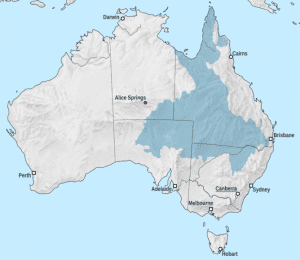Queensland Premier Steven Miles today banned carbon capture and storage in the Great Artesian Basin in Queensland.
Last week, the state’s environment department knocked back a proposal from mining giant Glencore, which was planning to truck waste CO2 from its Condamine power station and pump it into an aquifer of the Great Artesian Basin.
Greenhouse gas storage activities, including carbon capture and storage projects, will be permanently prohibited in the basin as part of the move to protect the critically important resource.
Many have been calling for the Federal Government follow suit after the Glencore project was found to be not a matter of environmental significance. AgForce has taken that decision to court but has calling on environment minister Tanya Plibersek to walk back the decision so it doesn’t have to go to court.
“All the Federal Government needs to do is call back the decision of 9th of December 2022. She has the power to do it at the stroke of a pen,” AgForce CEO Mike Guerin said.
“We don’t want to go to court, we just want her to call it back so we can have the discussion.”
Minister Plibersek has chosen not to comment.
The ban also extends to enhanced oil or petroleum recovery activities that use a greenhouse gas stream.
The ban, which will be legislated, clarifies that activities involving greenhouse gas storage or the injection of a greenhouse gas stream into underground formations within the Great Artesian Basin are not permissible.
These activities may be able to continue in other parts of the State subject to rigorous existing assessment and approval processes.
To support this, a Technical Expert Panel will review the safety aspects of greenhouse gas storage for areas outside the Great Artesian Basin. The Panel will be appointed soon and will report back in 2025.
The upcoming State Budget will also provide up to $32 million to continue the successful bore capping program, with Queensland seeking a matching contribution from the Australian Government.
This funding will support the implementation of the Great Artesian Basin and Other Regional Aquifers Water Plan, which requires all artesian stock and domestic bored to have watertight delivery systems by 2032.
Almost 770 bores have been rehabilitated and 450 drains piped. Around 15,000 kilometres of open drains have been decommissioned over the years.
This has saved more than 226,000 megalitres of water.
Groundwater pressure is increasing in the Great Artesian Basin thanks to this capping and piping work.
The increased water pressure is resulting in the re-emergence of natural springs and wetland ecosystems, providing important habitats for native wildlife and plants.
“Today is a great day for Queensland, for the environment, for farmers, and for the Great Artesian Basin,” Premier Steven Miles said.
“I think the Great Artesian Basin’s unique environmental, agricultural, economic and cultural significance is worth protecting.
“We will continue to review the safety aspects of greenhouse gas storage in the state to support future generations of Queenslanders and to ensure the Queensland’s great natural environment is preserved.”
Lotfeeders support decision
Australian Lot Feeders Association president Barb Madden said today’s landmark decision by Queensland Premier Steven Miles demonstrates a government willing to listen to the concerns of Queensland agricultural businesses and act decisively to prioritise food security.
“ALFA congratulates Queensland Premier, Steven Miles, and Agricultural Minister, Mark Furner, on listening to the concerns of the cattle lot feeding industry and showing enormous leadership in safeguarding against future CCS proposals in the GAB.
“Today the Queensland Government has decided to protect a critically important water resource and prioritise this for current and future agricultural and community use,” Mrs Madden said.
“On behalf of the many cattle lot feeding businesses located in the GAB region I welcome the Miles Government decision to protect GAB water from the risks of CCS and extend our thanks and appreciation.
“This issue has galvanised and brought together an array of industry, conservationists and community groups who have stood fast in opposition to CCS in the GAB.
“In reaching today’s outcome I would particularly like to acknowledge and thank AgForce, Queensland Farmers’ Federation and the National Farmers’ Federation on their tireless and collaborative advocacy efforts,” Mrs Madden said.
“Today’s decision sets an important precedent for other governments to put similar protections in place to protect GAB water under their jurisdiction and prioritise this resource for agricultural and community use.
Earlier article: Ag fears over plan to inject waste CO2 into Great Artesian Basin aquifer
EXPLAINER:
Carbon Capture and Storage involves securing greenhouse gas emissions from industrial processes and injecting them into underground geological formations for storage which prevents its release into the atmosphere.
Carbon Transport and Storage Corporation (CTSCo), a subsidiary of Glencore, proposed injecting CO2 into the Precipice Sandstone within the Great Artesian Basin – the largest underground freshwater resource in Australia which lies beneath parts of Queensland, Northern Territory, South Australia, and New South Wales.
Following a rigorous three-year assessment under the Environmental Protection Act 1994, Queensland’s independent environmental regulator has determined that the project is not suitable to proceed due to potential impacts on groundwater resources in the Great Artesian Basin.
The final assessment report is available online.
Source: Queensland Preimier

